 The following excerpt from Peter Grualnick’s biography of Sam Cooke (Dream Boogie: The Triumph of Sam Cooke, 2008) describes a concert that Jackie Wilson headlined in New Orleans on July 17, 1960. Jackie’s close friend Jesse Belvin had been killed just six months earlier after a concert that Jackie headlined in Little Rock (February 5). Guralnick is trying both to string together a narrative of the racial tension of the times and to connect Sam Cooke to the Civil Rights Movement. He has already written about Jackie’s good friend, Jesse Belvin, and the deaths of Belvin, his wife, and their driver. Because virtually everyone in the entertainment business was certain the crash was not an “accident,” Black entertainers performing in the South were on edge, concerned about the segregation of their audiences, their treatment at the hands of local civic leaders and law enforcement, and the developing national movement.
The following excerpt from Peter Grualnick’s biography of Sam Cooke (Dream Boogie: The Triumph of Sam Cooke, 2008) describes a concert that Jackie Wilson headlined in New Orleans on July 17, 1960. Jackie’s close friend Jesse Belvin had been killed just six months earlier after a concert that Jackie headlined in Little Rock (February 5). Guralnick is trying both to string together a narrative of the racial tension of the times and to connect Sam Cooke to the Civil Rights Movement. He has already written about Jackie’s good friend, Jesse Belvin, and the deaths of Belvin, his wife, and their driver. Because virtually everyone in the entertainment business was certain the crash was not an “accident,” Black entertainers performing in the South were on edge, concerned about the segregation of their audiences, their treatment at the hands of local civic leaders and law enforcement, and the developing national movement.
Sam Cooke was in no way involved in the the Little Rock concert, and the only thing associating him with this New Orleans concert of Jackie’s was that he would play the same venue a few weeks later (August 3). At that point, Guralnick reports, Cooke would find “a security force of fifty policemen on hand.” I am taking up Guralnick’s account of the New Orleans show mid-paragraph:
The Jackie Wilson Show, which continued to inflame audiences all across the South (it had already led to a direct ban on all rock ‘n’ roll revues in Birmingham), had hit New Orleans on July 17, with Larry Williams and Arthur Prysock (the co-headliner in Little Rock in February) on the bill. “The commotion started,” the Louisiana Weekly reported, “when Larry Williams attempted to sing from a sitting position on the edge of the stage.” A black policeman informed that it was against auditorium policy to sing from the floor, “and then a white officer allegedly pushed [him].” Williams, the man who wrote and recorded “Bad Boy” for Specialty Records in 1958 (he was a follower of the Johnny “Guitar” Watson/Johnnie Morisette school of thinking, in which music frequently fought a losing battle with pimping), was never one to avoid a confrontation, but it was Jackie Wilson, a former boxer, who at this point jumped from the stage and pushed the policeman, followed by five members of the band. There was no question in mind of anyone in the crowd as to who provoked the confrontation, and bottles and bricks began to fly, as “patrons [scrambled] for the exits . . . auditorium officials got the fire hoses ready [and] ten patrol wagons came blasting their sirens toward the scene.” Jackie, who never even got to perform, was bailed out at three in the morning and promptly left town, thereby avoiding charges (if the defendant couldn’t be found, the judge pragmatically ruled, there was no choice other than to dismiss), but the bitterness lingered on all sides, as some of the performers grumbled that none of this would be happening if the white man would leave them alone, others that Jackie and Larry were so damned hotheaded they just helped bring it on themselves.
I thought it would be interesting to contrast the account of the same event as presented by Tony Douglas in Jackie Wilson: Lonely Teardrops. Guralnick’s account was drawn largely from a newspaper account and focused on placing the riot in the context of other events. Guralnick, an American with knowledge of the cities, cultural upheaval, and events in play, is keenly aware of the pressures on the performers of this era. Douglas lacked Guralnick’s knowledge and insight, of course, but judging by the book as a whole, Douglas would not have been interested in these topics anyway.
Nonetheless, the Douglas account is more entertaining than Guralnick’s, in large part owing to the sources, singer Chuck Jackson and Midnighters’ guitarist Billy Davis. Yes, this is the wonderful Chuck Jackson of many hits, a true friend of Jackie Wilson’s and a great singer still performing today. As to the Billy Davis quoted in this account: this Billy Davis is the one the groupies called “The Face” (see photo below, where his dimple is pretty much the focal point of the picture). “The Face” should not be confused with other Billy Davises of the era.

Hank Ballard (lower right) and the Midnighters
Here’s what Douglas writes about the riot:
One steamy July night in 1960, at the Municipal Auditorium in New Orleans, a riot broke out at one of Jackie’s performances. Up to 5000 people were said to be present. Singer Chuck Jackson, a long-time close friend of Jackie’s was with The Dell Vikings at the time. He remembers: ‘I was there when Larry Williams was performing. The police told us before we got there, “Don’t come off this stage, black boy.”
‘They had police lined up all around the stage. Larry Williams had his foot up on the piano like Little Richard; he was doing “Dizzy Miss Lizzy” and he ran to the edge of the stage, but didn’t jump off. He got down on the of the stage and women came forward – white women! Jackie was standing backstage and the cops took Larry and pulled him into the audience and started beating him with their sticks. Jackie came from backstage like he was Johnny Weissmuller. He ran like he was Tarzan and he leapt, like he was leaping into a lake, into the crowd of policemen. When he hit the floor, he was like a little rabbit. He went down on his knees and when he came up, like he does on stage, he hit this cop, a big red cop. He messed him up bad. They beat him and nearly killed him.
‘We finally pulled him out and had to take him to the hospital. They took him to jail and we got him out. It took us a matter of minutes to get out of town. They had his picture in the paper, where he hit the cop.’ The riot received coverage in the newspapers, which stated that police laid charges which ‘ranged from attempted murder to assaulting police and inciting a riot. Wilson was booked with disturbing the peace, inciting a riot and assaulting an officer’.
Also present was Midnighters’ guitarist and friend, Billy Davis. “Larry would jump off the stage into the audience. The police said, “Don’t you do that no more.” The second the show started, Larry jumped out again. Jackie jumped up and the big cop pushed him back, then Jackie punched him out cold and Jackie could punch like George Foreman for a little guy. The cop was six foot one, 225 pounds; Jackie was 150 pounds and five foot nine. We were all locked up, but only for a few hours.
For the record: Jackie was actually only five foot seven. His beautifully proportioned physique made him appear taller. And except for roughly a year in the early 1970s, during which time he gave up on his career and life as a whole, Jackie stayed pretty much at the top of the welterweight limit, the weight at which he boxed as a teenager. (And, no, Jackie was not a Golden Gloves champion. Despite what you read or heard, he boxed in only a few actual matches and apparently lost most of them.)
 My policy is to comment on Jackie’s children only if they put themselves in the public eye. For example, Jackie’s oldest daughter by his first wife chose to be interviewed by Tony Douglas, so I have commented on her. That’s Denise the Daughter from Hell to the left of this text. Denise had not one kind word about her father, who never seemed to do enough to please her. If you parse the pages of the Douglas book carefully, you will find that Denise attended a private (Catholic) school for which her father paid the tuition and that she relates a story about showing up in her father’s dressing room in the late 1960s wearing a dress more expensive than most American women could afford today . . . a dress her father paid for, of course. But she complains bitterly that he missed attending her “sweet sixteen” party. In another comment, she complains that when he came home, the family felt compelled to be playing his records upon his arrival, which they found burdensome, so maybe Jackie thought he was doing her a favor by staying away from her birthday bash. Or perhaps he was just too busy singing himself hoarse to pay for the celebration.
My policy is to comment on Jackie’s children only if they put themselves in the public eye. For example, Jackie’s oldest daughter by his first wife chose to be interviewed by Tony Douglas, so I have commented on her. That’s Denise the Daughter from Hell to the left of this text. Denise had not one kind word about her father, who never seemed to do enough to please her. If you parse the pages of the Douglas book carefully, you will find that Denise attended a private (Catholic) school for which her father paid the tuition and that she relates a story about showing up in her father’s dressing room in the late 1960s wearing a dress more expensive than most American women could afford today . . . a dress her father paid for, of course. But she complains bitterly that he missed attending her “sweet sixteen” party. In another comment, she complains that when he came home, the family felt compelled to be playing his records upon his arrival, which they found burdensome, so maybe Jackie thought he was doing her a favor by staying away from her birthday bash. Or perhaps he was just too busy singing himself hoarse to pay for the celebration.

